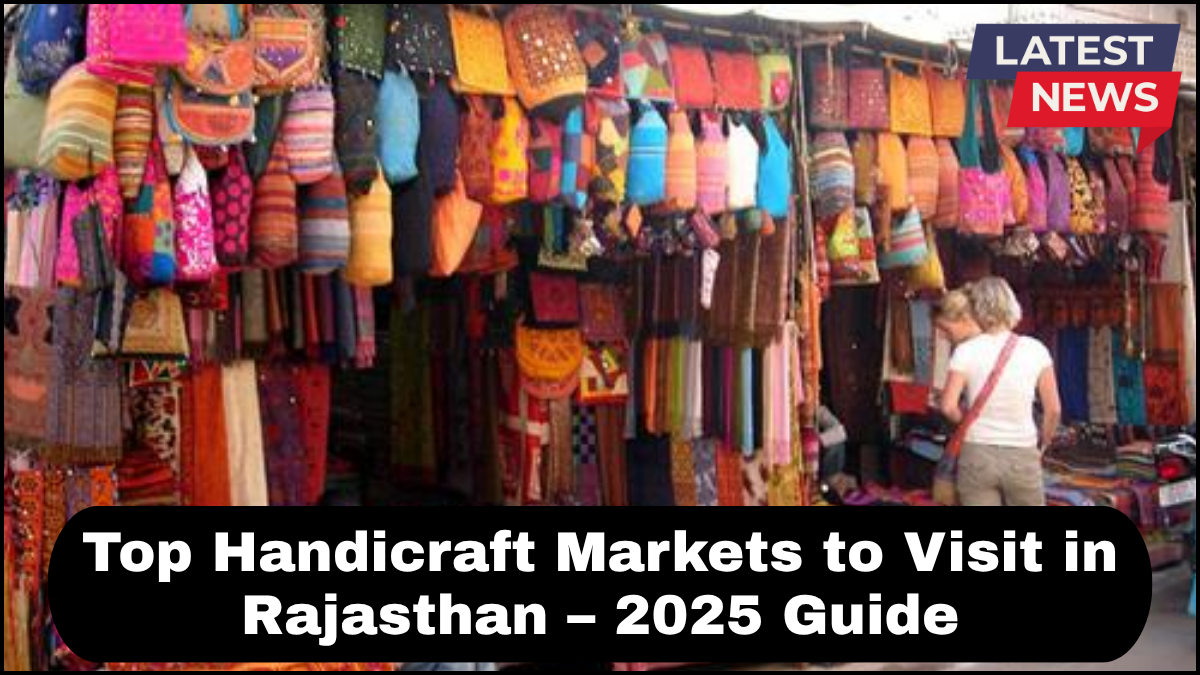Rajasthan is a treasure trove for those who appreciate craftsmanship, color, and culture. From vibrant textiles to intricate woodwork and ornate jewelry, the state is synonymous with handmade excellence. For travelers planning a shopping-focused trip, this 2025 guide to the Top Handicraft Markets in Rajasthan is your definitive companion. Whether you’re hunting for souvenirs or curating a personal collection, this shopping guide covers the most iconic bazaars and what makes each of them worth the visit.

1. Johari Bazaar, Jaipur – The Gem of Jewelry and Textile Trade
Located in the heart of Jaipur, Johari Bazaar is a must-visit for lovers of traditional Rajasthani jewelry. Known for its stunning Kundan, Meenakari, and Thewa designs, this market showcases age-old techniques still practiced by local artisans.
But jewelry isn’t all it offers. You’ll also find block-printed sarees, embroidered lehengas, and handwoven dupattas. The variety here makes it a key stop on any Top Handicraft Markets Rajasthan tour.
Pro Tip: Visit early in the day to avoid crowds and get better bargaining opportunities.
2. Bapu Bazaar, Jaipur – Affordable and Authentic Finds
Just a short walk from Johari Bazaar, Bapu Bazaar is where you go for budget-friendly shopping without compromising authenticity. It’s famous for mojris (traditional leather shoes), colorful home decor, and hand-stitched quilts.
Bapu Bazaar blends modern retail with a classic bazaar experience. Haggling is common, and shopkeepers are generally open to negotiation, especially if you’re buying in bulk.
Must Buy: Jaipuri bedsheets, mirror work handbags, and camel leather items.
3. Sadar Bazaar, Jodhpur – Where Vintage Meets Artisanal
In the shadow of Mehrangarh Fort, Sadar Bazaar pulses with life and legacy. It’s a vibrant blend of old-world charm and emerging artisanal trends. Shoppers here can browse antique brassware, hand-painted furniture, and traditional Rajasthani puppets.
The market’s central clock tower adds an extra layer of character, and its surrounding lanes are rich with handcrafted spice boxes, vintage textiles, and silver jewelry.
Insider Tip: Many local artisans set up temporary stalls on weekends—perfect for snagging rare, one-of-a-kind pieces.
4. Hathi Pol Bazaar, Udaipur – A Painter’s Paradise
Hathi Pol is Udaipur’s go-to spot for Pichwai and miniature paintings, making it ideal for art collectors and enthusiasts. You’ll also find leather-bound journals, embroidered juttis, and Phad paintings.
Prices here are usually fair, but having a sense of the standard market rates can help avoid overpaying. If you’re into textile art, keep an eye out for tie-dye (bandhej) scarves and hand-embroidered wall hangings.
Best Time to Visit: Late afternoon, when the sun dips and the colors of the market come alive.
5. Clock Tower Market, Jodhpur – Spices, Ceramics, and More
Though better known for spices, the Clock Tower Market also serves up a solid selection of hand-painted ceramics, blue pottery, and metal crafts. It’s a one-stop destination for foodies and craft lovers alike.
The aroma of freshly ground masalas combines with the visual appeal of handcrafted ware, creating an immersive shopping experience.
Don’t Miss: Lassi from nearby local vendors, a must-try while browsing.
6. Bada Bazaar, Udaipur – Variety Meets Tradition
Bada Bazaar is a bustling marketplace that caters to both locals and tourists. Expect to find lac bangles, tribal silver jewelry, and handloom saris, all steeped in Mewari tradition.
It’s one of the few markets where you can explore high-end boutique collections and local street vendors in the same stretch.
Highlight: Hand-dyed fabrics in natural colors, ideal for eco-conscious buyers.
7. Kishanpole Bazaar, Jaipur – Woodwork and Textiles Galore
Known for its skilled wood artisans, Kishanpole Bazaar offers beautifully carved furniture, sandalwood idols, and block-printed textiles. It’s less touristy compared to other Jaipur markets, making the experience feel more authentic.
Many of the artisans here have been practicing their trade for generations. Visiting their workshops offers deeper insights into the making of Rajasthan’s iconic handcrafted goods.
Perfect For: Buyers looking to ship larger items like wooden chests and carved wall panels.
Shopping Tips for Handicraft Markets in Rajasthan
-
Carry cash – While many shops accept digital payments, small vendors usually don’t.
-
Negotiate politely – Bargaining is expected, but respectful haggling goes a long way.
-
Check for authenticity – Look for government emporiums or certified sellers for high-value items.
-
Pack light – Leave room in your luggage for all the handcrafted treasures you’ll find.
FAQs – Rajasthan Handicraft Market Shopping Guide
Q1: What is the best time of year to visit Rajasthan for handicraft shopping?
A: The best time is between October and March when the weather is pleasant and many cultural festivals take place, often with pop-up craft fairs.
Q2: Are Rajasthan’s markets open all week?
A: Most are open every day except major holidays. Some, like Johari and Bapu Bazaar, may close early on Sundays.
Q3: How can I ensure I’m buying authentic handicrafts?
A: Buy from government-approved outlets, look for artisan cooperatives, or ask for origin certification, especially for items like jewelry and textiles.
Q4: Can I get items shipped internationally from these markets?
A: Yes, many larger shops and export houses offer packing and shipping services for an additional fee.
Q5: What are the top souvenirs to buy from Rajasthan?
A: Blue pottery, miniature paintings, Kundan jewelry, embroidered textiles, mojris, and hand-carved wooden decor are some of the most popular and unique items.
click here to learn more